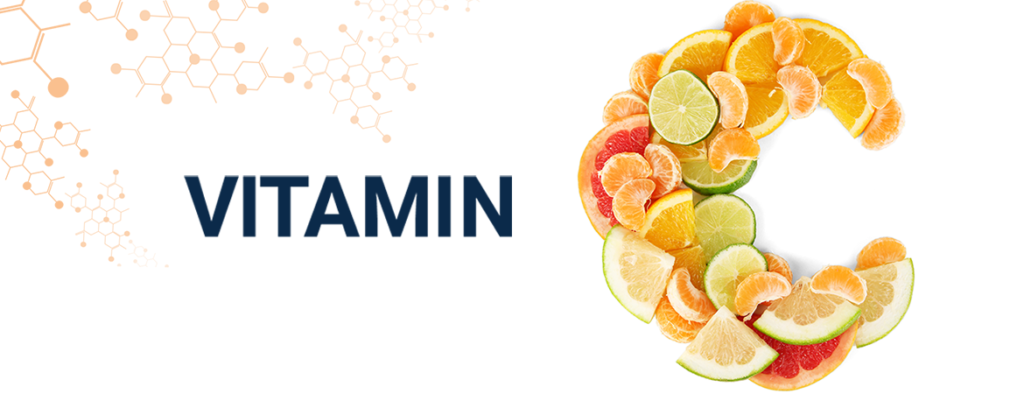Vitamin C is one of the most essential vitamins amongst others. In medical terminology, it is called L-ascorbic acid, as it is a water-soluble vitamin that is naturally present in some of the food items that you consume each day on a daily basis. But in case of deficiency of Vitamin C dietary supplement and medicinal help is required. Vitamin C cannot be synthesized endogenously in Humans and even in most animals, so it is an essential dietary component and should be taken care of while having a balanced diet. Let’s learn why it is important and how it breaks down in the human body?
Vitamin C plays a crucial part in the biosynthesis of few neurotransmitters; collagen, L-carnitine, which is required in protein metabolism. For connective tissue, Collagen plays an essential component and helps the cells to heal. It means it works for the healing of wounds, scars, cuts, and even marks.
Vitamin C is also popularly known as an eminent physiological antioxidant. With its miracle properties, it supports to regenerate of other antioxidants in the human body. This includes alpha-tocopherol which breaks down into vitamin E. Vitamin C is also called to limit the harmful effects of free radicals through its antioxidant process. Therefore it might help to stop the development of certain cancer cells, various cardiovascular diseases, and other symptoms of oxidative stress. It offers biosynthetic and antioxidant functions along with boosting immune function in the body to improve the absorption of iron present in plant-based foods. Insufficient vitamin C intake may lead to serious health hazards and deadly and often permanent diseases like causes scurvy, which is characterized by fatigue, connective tissue weakness, and capillary fragility.

How Vitamin C functions in our bodies?
Vitamin C is absorbed in the intestines and is regulated by an active transporter present in our bodies. These cells accumulate vitamin C via a secondary specific transport protein. Here the Oxidized vitamin C, enters cells via some facilitated glucose transporters and is then gets reduced internally to ascorbic acid. In the case of Oral vitamin C, it is produced in the tissue and plasma concentrations. Around 70%–90% of vitamin C is wrapped up at moderate intakes of 30–180 mg/day in an adult human being. However, at doses above 1 g/day, absorption falls to less than 50%, and absorbed, unmetabolized ascorbic acid is excreted in the urine.
An oral dose of Vitamin C taken in a quantity of 1.25 g/day is two times higher than those produced by consuming 200–300 mg/day ascorbic acid from vitamin C-rich foods. Even doses with 3g ascorbic acid would produce peak plasma concentrations of 220 micromol/L.
The total body content of vitamin C ranges from 300 which is often characterized as a case of scurvy to about 2 g. Very high levels of vitamin C are maintained in body cells and tissues and are highest in leukocytes also called white blood cells, eyes, the adrenal glands, the pituitary gland, and the brain, and low levels of vitamin C are found in various fluids, such as plasma, red blood cells, and saliva.
Recommended Intakes in adults:
Intake recommendations for vitamin C by a specialist- On the average daily level of a healthy diet is sufficient to meet the nutrient requirements of nearly all healthy adult individuals. The average daily level of intake estimated to meet the requirements of 50% of healthy individuals; usually used to assess the nutrient intakes of groups to plan nutritionally adequate diets for them. While it is also important to remember that maximum daily intake Of Vitamin D on a daily basis is likely to cause adverse health effects like diarrhea, nausea, abdominal cramps, and other gastrointestinal disturbances due to the osmotic effect of unabsorbed vitamin C.
Major Sources of Vitamin C:
Citrus Fruits and vegetables are the best sources of vitamin C. Citrus fruits, tomatoes, and tomato juice, and potatoes are major contributors of the vitamin C diet. Other good food sources include red and green peppers, kiwifruit, broccoli, strawberries, Brussels sprouts, and cantaloupe. Although vitamin C is not naturally present in grains, it is added to some fortified breakfast cereals. The vitamin C content of food often gets reduced during cooking because ascorbic acid is water, Steaming and microwaving. Therefore fruits and vegetables should be consumed raw. It is recommended to have five varied servings of fruits and vegetables a day that helps in getting than 200 mg of vitamin C.
Vitamin C Deficiency- Symptoms and effects
Vitamin C deficiency leads to scurvy where signs can appear within 1 month of no vitamin C intake. Initial symptoms can include fatigue, malaise, and inflammation of the gums. In case of the prolonged deficiency progresses, collagen synthesis becomes impaired and connective tissues become weakened, causing petechiae, ecchymoses, purpura, joint pain, poor wound healing, hyperkeratosis, and corkscrew hairs. Additional signs include depression as well as swollen, bleeding gums and loosening or loss of teeth due to tissue and capillary fragility Iron deficiency anemia. It also decreases plant-based iron absorption secondary to low vitamin C intake.
Vitamin C and its effect on health
Vitamin C plays a vital function as an antioxidant and an important role in immune functioning. It has been promoted as a means to prevent and treat numerous health conditions like cancer, cardiovascular disease, age-related macular degeneration (AMD), and even common cold and flu.
In case of patients undergoing Chemotherapy and radiation:
The usefulness of the having of vitamin C and other antioxidants in cancer treatment is very controversial. In serious cases, antioxidants might protect tumor cells from the action of radiation therapy and chemotherapeutic agents, such as cyclophosphamide, chlorambucil, and doxorubicin. But it is rather better to consult an oncologist before taking vitamin C or other antioxidant supplements.
The Dietary Guidelines for a healthy intake of Vitamin c:
- Include seasonal vegetables, fruits, whole grains, in your diet along with fat-free or low-fat milk and dairy products along with various kinds of oils and seeds.
- Citrus fruits like Oranges, Lemon etc juices, and many vegetables are excellent sources of vitamin C. Even there are ready-to-eat breakfast cereals filled with vitamin C.
- Have a variety of protein foods like seafood, lean meats and poultry, eggs, legumes beans and peas, nuts, seeds, and soy products.
- Limit products that have an excess of saturated, trans fats, added sugars, and sodium.
- Make a daily calorie chart and don’t overeat.
Hope it answers all concerns related to Vitamin C and provides the right solutions for your problems. For any further questions feel free to reach us on our customer care number.

